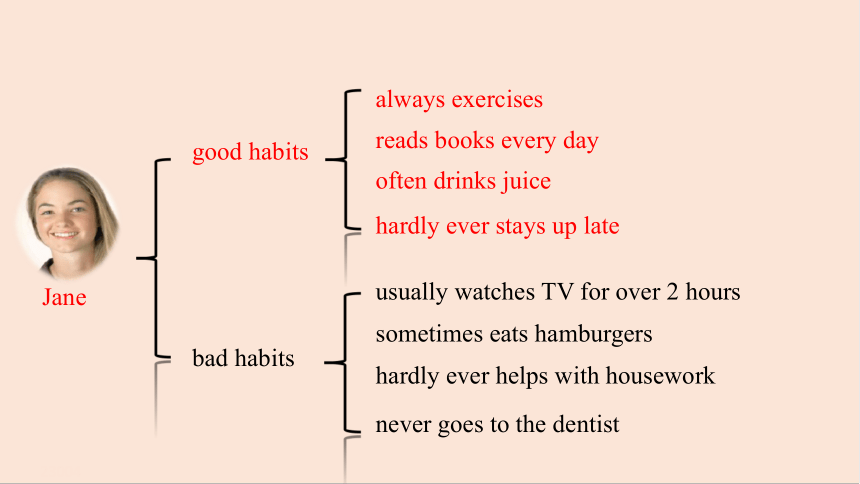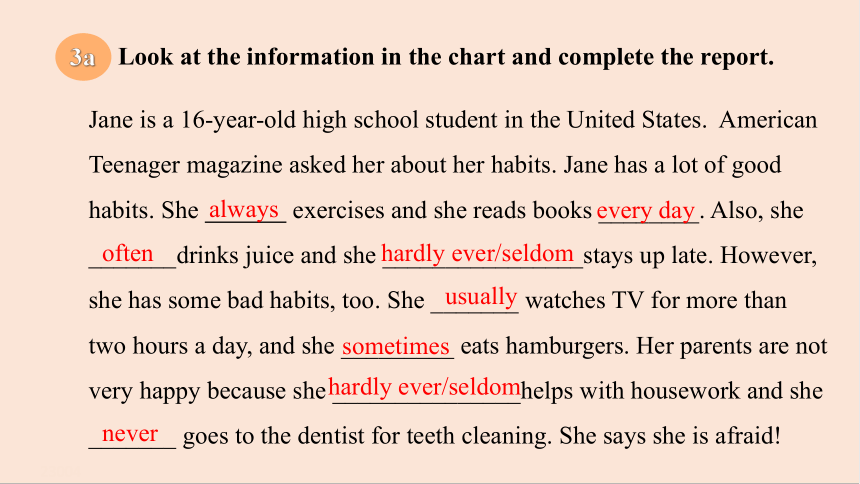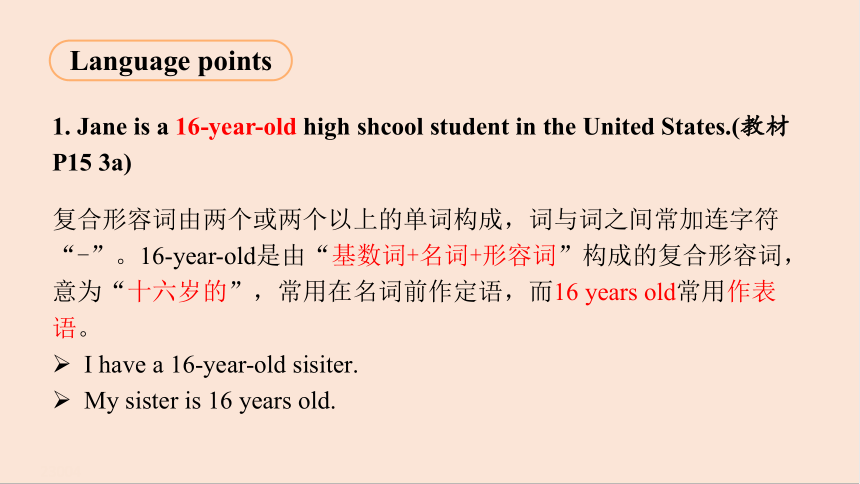Unit 2 How often do you exercise?Section B (3a~4)课件(共26张PPT)
文档属性
| 名称 | Unit 2 How often do you exercise?Section B (3a~4)课件(共26张PPT) |  | |
| 格式 | pptx | ||
| 文件大小 | 1.1MB | ||
| 资源类型 | 教案 | ||
| 版本资源 | 人教新目标(Go for it)版 | ||
| 科目 | 英语 | ||
| 更新时间 | 2024-10-10 16:17:26 | ||
图片预览









文档简介
(共26张PPT)
Section B (3a~4)
Unit 2
How often do you exercise
To learn some important words and phrases:
a 16-year-old high school student; go to the
dentist; magazine; ask sb. about sth.; however;
more than, less than; afraid
2. To write a passage about your good habits and bad habits.
学习目标
Activities Days a year
Exercise Read books Watch TV for over 2 hours Drink juice Eat hamburgers Help with housework Stay up late Go to the dentist 365
365
320
210
95
20
15
0
How often does she...
always/every day
always/every day
usually
often
sometimes
seldom
hardly ever
never
Look at the chart about Jane carefully and answer the questions.
1. What information can you find in the chart
2. What does the heading “Days a year” mean
3. What good habits does the girl have
4. Does the girl have any bad habits What are they
Jane
always exercises
reads books every day
often drinks juice
hardly ever stays up late
usually watches TV for over 2 hours
sometimes eats hamburgers
hardly ever helps with housework
never goes to the dentist
good habits
bad habits
Jane is a 16-year-old high school student in the United States. American Teenager magazine asked her about her habits. Jane has a lot of good habits. She exercises and she reads books ________. Also, she _______drinks juice and she ________________stays up late. However, she has some bad habits, too. She _______ watches TV for more than two hours a day, and she _________ eats hamburgers. Her parents are not very happy because she _______________helps with housework and she _______ goes to the dentist for teeth cleaning. She says she is afraid!
Look at the information in the chart and complete the report.
every day
often
hardly ever/seldom
usually
sometimes
hardly ever/seldom
never
always
3a
1. Jane is a 16-year-old high shcool student in the United States.(教材P15 3a)
复合形容词由两个或两个以上的单词构成,词与词之间常加连字符“-”。16-year-old是由“基数词+名词+形容词”构成的复合形容词,意为“十六岁的”,常用在名词前作定语,而16 years old常用作表语。
I have a 16-year-old sisiter.
My sister is 16 years old.
Language points
(1)数字+ - +名词: a 3-year plan
(2)形容词+ - +名词-ed: a warm-hearted woman
(3)形容词+ - +动词-ing: a good-looking girl
【拓展】复合形容词的其他形式:
2. However, she has some bad habits, too.
however与but均可意为“然而;不过”,表示转折。
【易混辨析】however与but
however 副词 可位于句首、句中、句末,一般用逗号与句子的其他成分隔开。 较为正式。
but 连词 常位于它所引出的分句之首,其后通常不用逗号隔开。 较为口语化。
3. She usually watches TV for more than two hours a day, and she sometimes eats hamburgers.
more than相当于over,意为“多于”,常用于数词前,反义短语为less than“少于”。
There are more than 5,000 students in our school.
【拓展】“no more than+数词”表示“至多;仅仅”。
There are no more than two books left.
Jane is a 16-year-old high school student in the United States. American Teenager magazine asked her about her habits.
Jane has a lot of good habits. She always exercises and she reads books ________. Also, she ________drinks juice and she __________ stays up late.
However, she has some bad habits, too. She _______ watches TV for more than two hours a day, and she __________ eats hamburgers. Her parents are not very happy because she ______ ______helps with housework and she ______ goes to the dentist for teeth cleaning. She says she is afraid.
every day
often
hardly ever
usually
sometimes
hardly
ever
never
Read and find out the structure of the passage.
No ending
Body
Beginning
姓名、年龄、身份、国籍, 事件
饮食、学习、健身、家务、休闲、好习惯、坏习惯
Everyone has different habits. We should keep the good habits and try to change or say “No” to the bad ones.
A possible ending
My
Habits
What will the structure of the passage be like
Beginning
Body
Ending
How can we make our passage vivid and attractive
Jane is a 16-year-old high school student in the United States. American Teenager magazine asked her about her habits.
Jane has a lot of good habits. She always exercises and she reads books every day. Also, she often drinks juice and she hardly ever stays up late. However, she has some bad habits, too. She usually watches TV for more than two hours a day, and she sometimes eat hamburgers. Her parents are not very happy because she sometimes helps with housework and she never goes to the dentist for teeth cleaning. She says she is afraid!
Tip 1
topic sentence
主题句可以使文章层次更清晰。
Jane is a 16-year-old high school student in the United States. American Teenager magazine asked her about her habits.
Jane has a lot of good habits. She always exercises and she reads books every day. Also, she often drinks juice and she hardly ever stays up late. However, she has some bad habits, too. She usually watches TV for more than two hours a day, and she sometimes eat hamburgers. Her parents are not very happy because she sometimes helps with housework and she never goes to the dentist for teeth cleaning. She says she is afraid!
Tip 2
连词(并列关系,因果关系,转折关系)可以使段与段,句与句之间逻辑更加清楚。
Jane is a 16-year-old high school student in the United States. American Teenager magazine asked her about her habits.
Jane has a lot of good habits. She always exercises and she reads books every day. Also, she often drinks juice and she hardly ever stays up late. However, she has some bad habits, too. She usually watches TV for more than two hours a day, and she sometimes eat hamburgers. Her parents are not very happy because she sometimes helps with housework and she never goes to the dentist for teeth cleaning. She says she is afraid!
Tip 3
加入别人的评价或者观点,可以使文章更加丰富,更有吸引力。
Complete the chart with your own information. In the last column, use expressions like always, every day, twice a week and never.
Habits Activities How often
Good habits
every day
always
every day
never
four times a week
Exercise
Read books
Eat fruit
Drink milk
Stay up late…
3b
Habits Activities How often
Bad habits Watch TV for over 2 hours Use the Internet Eat hamburgers Help with housework Go to the dentist…
always
often
every day
hardly ever
never
Write a report about your good and bad habits. Say how often you do things. Use the report in 3a as an example.
【思路点拨】 Step Idea Expression
1 引出话题 Everyone has his own habits. Here are my good habits and bad habits.
2 描述习惯 I have some good habits. I always…
However, I have some bad habits. I often…
3 归纳总结 As students, we should have some good habits. They are good for our health.
注意:写自己日常生活中的好习惯与坏习惯,应用一般现在时态。
3c
列提纲 写句子
引出 话题 Everyone has his own habits. Here are my good habits and bad habits.
习惯 好习惯
(1) I _________________________(经常帮忙做家务).
(2) I ___________________________________.
(总是独立完成作业).
(3) I ______________________________.
(每天吃水果蔬菜).
(4) I ________________(看牙医) for teeth cleaning twice a year.
(5) I __________________________(上学从来不迟到).
often help with housework
always finish my homework by myself
eat fruit and vegetables every day
go to the dentist
never arrive late for school
列提纲 写句子
引出话题 Everyone has his own habits. Here are my good habits and bad habits.
习惯 坏习惯
(6) I never do some reading.
(7) I ____________________(经常使用互联网) deep into the night.
(8) I eat junk food ______________________(一周三到五次).
(9) ______________________________(我几乎从不运动).
often use the Internet
three to five times a week
I hardly ever exercise / play sports
巧衔接
罗列好习惯和坏习惯时可用and, also等词作为列举的连接纽带,从写好习惯转到写坏习惯时可用however作为对比和转折的连接纽带。
添佳句
Good habits will benefit people forever.
好习惯使人终生受益。
Old habits die hard, so I’ll start changing before it’s too late!
旧习难改,因此我会尽早改。
1. Almost every day. (教材P16 4)
(1) almost 常用来表示程度,意为“几乎;差不多”,同义词是nearly。
I heard almost all the stories about him.
Today, almost everyone has a smart phone.
(2) almost可与never,、no、 none、 nothing等词连用,但不能与very连用。
My friends almost never went to gym.
Language points
2. None/n n/ pron.没有一个 (教材P16 4)
【易混辨析】none与no one
none
no one
即可
指人,
也可
指物。
意为“没有人”
只能指人
通常与of短语连用,作主语时,谓语动词既可用单数,也可用复数。
不能与of短语连用,作主语时,谓语动词用单数。
常用来回答how many或how much(提问价格的情况除外)引导的特殊疑问句。
常用来回答 who引导的特殊疑问句。
意为“没有一个”
一、单项选择
1. This is _______boy. That girl is _______.
A. an 8-year-old; 6 years old B. a 8 -year-old; 6 years old
C. an 8-year-old; 6-years old D. a 8 year-old; 6-year-old
2.—Although these were good students,
of them had a score above 60.
—I can't believe it!
A. none B. no one C. some D.all
A
A
当堂检测
3. Mark is a great _______. If you have problems with your teeth, you can ask him for help.
dentist B. singer C. musician D. writer
4. —Can you catch what I said
—Sorry, I can _______understand it because you speak
very quickly.
A. almost B. probably C. mostly D. hardly
D
A
Section B (3a~4)
Unit 2
How often do you exercise
To learn some important words and phrases:
a 16-year-old high school student; go to the
dentist; magazine; ask sb. about sth.; however;
more than, less than; afraid
2. To write a passage about your good habits and bad habits.
学习目标
Activities Days a year
Exercise Read books Watch TV for over 2 hours Drink juice Eat hamburgers Help with housework Stay up late Go to the dentist 365
365
320
210
95
20
15
0
How often does she...
always/every day
always/every day
usually
often
sometimes
seldom
hardly ever
never
Look at the chart about Jane carefully and answer the questions.
1. What information can you find in the chart
2. What does the heading “Days a year” mean
3. What good habits does the girl have
4. Does the girl have any bad habits What are they
Jane
always exercises
reads books every day
often drinks juice
hardly ever stays up late
usually watches TV for over 2 hours
sometimes eats hamburgers
hardly ever helps with housework
never goes to the dentist
good habits
bad habits
Jane is a 16-year-old high school student in the United States. American Teenager magazine asked her about her habits. Jane has a lot of good habits. She exercises and she reads books ________. Also, she _______drinks juice and she ________________stays up late. However, she has some bad habits, too. She _______ watches TV for more than two hours a day, and she _________ eats hamburgers. Her parents are not very happy because she _______________helps with housework and she _______ goes to the dentist for teeth cleaning. She says she is afraid!
Look at the information in the chart and complete the report.
every day
often
hardly ever/seldom
usually
sometimes
hardly ever/seldom
never
always
3a
1. Jane is a 16-year-old high shcool student in the United States.(教材P15 3a)
复合形容词由两个或两个以上的单词构成,词与词之间常加连字符“-”。16-year-old是由“基数词+名词+形容词”构成的复合形容词,意为“十六岁的”,常用在名词前作定语,而16 years old常用作表语。
I have a 16-year-old sisiter.
My sister is 16 years old.
Language points
(1)数字+ - +名词: a 3-year plan
(2)形容词+ - +名词-ed: a warm-hearted woman
(3)形容词+ - +动词-ing: a good-looking girl
【拓展】复合形容词的其他形式:
2. However, she has some bad habits, too.
however与but均可意为“然而;不过”,表示转折。
【易混辨析】however与but
however 副词 可位于句首、句中、句末,一般用逗号与句子的其他成分隔开。 较为正式。
but 连词 常位于它所引出的分句之首,其后通常不用逗号隔开。 较为口语化。
3. She usually watches TV for more than two hours a day, and she sometimes eats hamburgers.
more than相当于over,意为“多于”,常用于数词前,反义短语为less than“少于”。
There are more than 5,000 students in our school.
【拓展】“no more than+数词”表示“至多;仅仅”。
There are no more than two books left.
Jane is a 16-year-old high school student in the United States. American Teenager magazine asked her about her habits.
Jane has a lot of good habits. She always exercises and she reads books ________. Also, she ________drinks juice and she __________ stays up late.
However, she has some bad habits, too. She _______ watches TV for more than two hours a day, and she __________ eats hamburgers. Her parents are not very happy because she ______ ______helps with housework and she ______ goes to the dentist for teeth cleaning. She says she is afraid.
every day
often
hardly ever
usually
sometimes
hardly
ever
never
Read and find out the structure of the passage.
No ending
Body
Beginning
姓名、年龄、身份、国籍, 事件
饮食、学习、健身、家务、休闲、好习惯、坏习惯
Everyone has different habits. We should keep the good habits and try to change or say “No” to the bad ones.
A possible ending
My
Habits
What will the structure of the passage be like
Beginning
Body
Ending
How can we make our passage vivid and attractive
Jane is a 16-year-old high school student in the United States. American Teenager magazine asked her about her habits.
Jane has a lot of good habits. She always exercises and she reads books every day. Also, she often drinks juice and she hardly ever stays up late. However, she has some bad habits, too. She usually watches TV for more than two hours a day, and she sometimes eat hamburgers. Her parents are not very happy because she sometimes helps with housework and she never goes to the dentist for teeth cleaning. She says she is afraid!
Tip 1
topic sentence
主题句可以使文章层次更清晰。
Jane is a 16-year-old high school student in the United States. American Teenager magazine asked her about her habits.
Jane has a lot of good habits. She always exercises and she reads books every day. Also, she often drinks juice and she hardly ever stays up late. However, she has some bad habits, too. She usually watches TV for more than two hours a day, and she sometimes eat hamburgers. Her parents are not very happy because she sometimes helps with housework and she never goes to the dentist for teeth cleaning. She says she is afraid!
Tip 2
连词(并列关系,因果关系,转折关系)可以使段与段,句与句之间逻辑更加清楚。
Jane is a 16-year-old high school student in the United States. American Teenager magazine asked her about her habits.
Jane has a lot of good habits. She always exercises and she reads books every day. Also, she often drinks juice and she hardly ever stays up late. However, she has some bad habits, too. She usually watches TV for more than two hours a day, and she sometimes eat hamburgers. Her parents are not very happy because she sometimes helps with housework and she never goes to the dentist for teeth cleaning. She says she is afraid!
Tip 3
加入别人的评价或者观点,可以使文章更加丰富,更有吸引力。
Complete the chart with your own information. In the last column, use expressions like always, every day, twice a week and never.
Habits Activities How often
Good habits
every day
always
every day
never
four times a week
Exercise
Read books
Eat fruit
Drink milk
Stay up late…
3b
Habits Activities How often
Bad habits Watch TV for over 2 hours Use the Internet Eat hamburgers Help with housework Go to the dentist…
always
often
every day
hardly ever
never
Write a report about your good and bad habits. Say how often you do things. Use the report in 3a as an example.
【思路点拨】 Step Idea Expression
1 引出话题 Everyone has his own habits. Here are my good habits and bad habits.
2 描述习惯 I have some good habits. I always…
However, I have some bad habits. I often…
3 归纳总结 As students, we should have some good habits. They are good for our health.
注意:写自己日常生活中的好习惯与坏习惯,应用一般现在时态。
3c
列提纲 写句子
引出 话题 Everyone has his own habits. Here are my good habits and bad habits.
习惯 好习惯
(1) I _________________________(经常帮忙做家务).
(2) I ___________________________________.
(总是独立完成作业).
(3) I ______________________________.
(每天吃水果蔬菜).
(4) I ________________(看牙医) for teeth cleaning twice a year.
(5) I __________________________(上学从来不迟到).
often help with housework
always finish my homework by myself
eat fruit and vegetables every day
go to the dentist
never arrive late for school
列提纲 写句子
引出话题 Everyone has his own habits. Here are my good habits and bad habits.
习惯 坏习惯
(6) I never do some reading.
(7) I ____________________(经常使用互联网) deep into the night.
(8) I eat junk food ______________________(一周三到五次).
(9) ______________________________(我几乎从不运动).
often use the Internet
three to five times a week
I hardly ever exercise / play sports
巧衔接
罗列好习惯和坏习惯时可用and, also等词作为列举的连接纽带,从写好习惯转到写坏习惯时可用however作为对比和转折的连接纽带。
添佳句
Good habits will benefit people forever.
好习惯使人终生受益。
Old habits die hard, so I’ll start changing before it’s too late!
旧习难改,因此我会尽早改。
1. Almost every day. (教材P16 4)
(1) almost 常用来表示程度,意为“几乎;差不多”,同义词是nearly。
I heard almost all the stories about him.
Today, almost everyone has a smart phone.
(2) almost可与never,、no、 none、 nothing等词连用,但不能与very连用。
My friends almost never went to gym.
Language points
2. None/n n/ pron.没有一个 (教材P16 4)
【易混辨析】none与no one
none
no one
即可
指人,
也可
指物。
意为“没有人”
只能指人
通常与of短语连用,作主语时,谓语动词既可用单数,也可用复数。
不能与of短语连用,作主语时,谓语动词用单数。
常用来回答how many或how much(提问价格的情况除外)引导的特殊疑问句。
常用来回答 who引导的特殊疑问句。
意为“没有一个”
一、单项选择
1. This is _______boy. That girl is _______.
A. an 8-year-old; 6 years old B. a 8 -year-old; 6 years old
C. an 8-year-old; 6-years old D. a 8 year-old; 6-year-old
2.—Although these were good students,
of them had a score above 60.
—I can't believe it!
A. none B. no one C. some D.all
A
A
当堂检测
3. Mark is a great _______. If you have problems with your teeth, you can ask him for help.
dentist B. singer C. musician D. writer
4. —Can you catch what I said
—Sorry, I can _______understand it because you speak
very quickly.
A. almost B. probably C. mostly D. hardly
D
A
同课章节目录
- Unit 1 Where did you go on vacation?
- Section A
- Section B
- Unit 2 How often do you exercise?
- Section A
- Section B
- Unit 3 I'm more outgoing than my sister.
- Section A
- Section B
- Unit 4 What's the best movie theater?
- Section A
- Section B
- Unit 5 Do you want to watch a game show?
- Section A
- Section B
- Unit 6 I'm going to study computer science.
- Section A
- Section B
- Unit 7 Will people have robots?
- Section A
- Section B
- Unit 8 How do you make a banana milk shake?
- Section A
- Section B
- Unit 9 Can you come to my party?
- Section A
- Section B
- Unit 10 If you go to the party, you'll have a grea
- Section A
- Section B
